 |
|
|
| OR |
|
|

|
|
|
|
|
|
|
|
|
|
|
|
|
|
Martin Lings’s life and work
|
|
This site includes Martin Lings’s biography, photos, online articles, slideshows, bibliography, links, and more.
|
|
|
|
|
|
|
Martin Lings (1909-2005) was a leading member of the “Traditionalist” or “Perennialist” school and an acclaimed author, editor, translator, scholar, Arabist, and poet whose work centers on the relationship between God and man through religious doctrine, scripture, symbolism, literature, and art. He was an accomplished metaphysician and essayist who often turned to a number of the world’s great spiritual traditions for examples, though he is most likely best known for his writings on Islam and its esoteric tradition, Sufism.
Lings was born in Lancashire, England, in 1909 and received both his BA (1932) and his MA (1937) from Oxford University in English literature.[1] After teaching English in Poland, he was appointed lecturer in Anglo-Saxon and Middle English at the University of Kaunas in Lithuania, where he remained until 1939. He taught English and English literature—primarily Shakespeare—at the University of Cairo from 1940 until 1951. He joined the British Library in 1955 as Keeper of the Arabic Library, eventually becoming the Keeper of Oriental Manuscripts at the British Museum and the British Library until his retirement in 1973. Lings received his PhD from the University of London in 1959.
In 1935 Lings discovered the writings of René Guénon, the French philosopher (1886-1951) who was the founder of the “Perennialist” or “Traditionalist” school of thought. Guénon’s writings provided Lings with the intellectual keys for an understanding of the errors of a modern world in which religion had become marginalized; Guénon’s writings also awakened within him the realization that there is a common inner Truth that exists within each of the great world religions—“an esoteric aspect” sometimes called the sophia perennis (perennial wisdom)—and that “each of the world’s great religions is a true religion”. Further, Guénon explained that each of the great traditional religions offers a path of prayer that leads toward re-establishing man’s original “primordial perfection and union with God”. In response, Lings realized, “I knew that I was face to face with the Truth. It was almost like being struck by lightning…. I knew that something must be done about this”.[2]
In 1937 Martin Lings encountered some of the first articles published by Frithjof Schuon (1907-1998) in Études Traditionnelles, a French journal edited by Guénon. Lings learned that Schuon lived in Switzerland and went there to see him in January 1938. After this formative meeting Lings became a lifelong and dedicated disciple of Schuon. Lings soon thereafter traveled to Cairo to meet Guénon and for the next eleven years he earned his living by teaching English at the University of Cairo, while perfecting his Arabic language skills and also serving as Guénon’s personal secretary. This period also marked the start of Lings’ writing career, beginning with The Book of Certainty: The Sufi Doctrine of Faith, Vision, and Gnosis, which he first wrote in Arabic and then translated into English (first English edition 1952). This comprehensive account of Sufi doctrine was published under Lings’ Islamic name—Abu Bakr Siraj ad-Din. The book demonstrates Lings’ comprehensive knowledge of the Koran and traditional Sufi metaphysics, as well as a deep interest in universal symbolism. It also reveals his way with English prose, which always tends toward the poetic.
While living in Cairo, Lings maintained a correspondence with a young woman he had met when she was just four and he eight years old. In 1944 this young woman, Leslie Smalley, became his wife and spiritual companion for the remainder of his life.
After the death of Guénon in 1951, and the upheavals of Egyptian nationalism, Lings and his wife returned to London where he completed his PhD while working for the British Museum. His thesis was later revised and published as A Moslem Saint of the Twentieth Century: Shaikh Ahmad al-‘Alawi (1961).[3] It is recognized as the definitive study of the life and teachings of this great Sufi master and has now been translated into languages that include French, Spanish, Persian, Urdu, and Arabic. The renowned Cambridge professor of Islamic Studies, A.J. Arberry, hailed the “important original contributions to knowledge” in the book, adding, “I know of no more lucid and convincing interpretation of Ibn Arabi’s much debated ‘pantheistic’ philosophy”.
Lings’ position at the British Museum and British Library gave him exceptional access to rare oriental manuscripts, thus allowing him to publish the most comprehensive and definitive study on the sacred art of Koranic reproduction in The Qur’anic Art of Calligraphy and Illumination (1976).[4] Martin Lings has thus presented the world with a comprehensive volume on Sufi doctrine (The Book of Certainty), a penetrating introduction to Sufism entitled What is Sufism? (1975), and three definitive studies on Islam: on the Sufi Shaykh Ahmad al-Alawi, on the sacred art of the Koran, and his tour de force on the Prophet Muhammad. Islamic Quarterly called his best-selling Muhammad: His Life Based Upon the Earliest Sources (1983), “an enthralling story that combines impeccable scholarship with a rare sense of the sacred worthy of the subject”. This book has been translated into more than a dozen languages and has received numerous awards.
The names of Martin Lings and Abu Bakr Siraj ad-Din are widely known and acclaimed throughout the Islamic world as an eminent exponent of authentic Islam, including Sufism, the heart of Islamic spirituality. But while he is best known for his brilliant expositions of Islam and Islamic mysticism, it would be a mistake to conclude that Lings’ spiritual interests and writings were limited to Islam; rather his philosophical perspective is rooted in the esoteric truths contained within every religion, truths that are illuminated by the writers in the Perennialist school. This school was founded by Guénon, continued by A.K. Coomaraswamy (1877-1947), and reached its fullest development with the writings of Frithjof Schuon. But Martin Lings will be remembered as one of the foremost contributors to this school of thought, together with his close friends Titus Burckhardt and Seyyed Hossein Nasr.
Lings published three books on universal wisdom during his life: a critique of the modern world, entitled Ancient Beliefs and Modern Superstitions (1964); The Eleventh Hour: The Spiritual Crisis of the Modern World in the Light of Tradition and Prophecy (1987), in which he deals with eschatological questions; and Symbol and Archetype: A Study of the Meaning of Existence (1991), which is a masterful study of the traditional doctrine of symbols. But his indefatigable energy has resulted in the publication of three posthumous works. A Return to the Spirit: Questions and Answers (2005) is the story of his own spiritual quest and a compilation of some of the answers he has provided over the years to spiritual seekers; The Underlying Religion (2007) is an anthology of articles selected by Lings to introduce readers to the essential teachings of the Perennialist school (the preface to this anthology was written less than a month before his death); and The Holy Qur’an: Translations of Selected Verses (2007).
Martin Lings was also a poet. C.S. Lewis said of some of Lings’ poetry that it was “sheer inspiration”. Indeed, poetry was Lings’ first calling, and he was steeped in the music and eloquence of early English poetry, the verses of Dante, and, of course, the genius of Shakespeare. Yet, after encountering the spiritual message of Guénon and Schuon, and beginning upon his spiritual path, he did not feel ready to write poetry again for many years. In the introduction to his first book of poetry, he was later to write that “my poetical ambition had been absorbed into a higher ambition, the only one worth having”, meaning the spiritual quest. It was only upon the completion of a spiritual retreat of many weeks that poetry again began to flow through his pen. He had not written poetry for fifteen years. He subsequently published two books of poems, The Elements, and Other Poems and The Heralds, and Other Poems, which appear together in Collected Poems: Revised and Augmented (2001). These are all poems of introspection and wisdom, with a keen eye to the beauties of the natural world and a deep sense of the sacred. Martin Lings clearly had the soul of a born poet as well as the skill of a craftsman of fine verse, and his spiritual attainment provided the appropriate content.
His written legacy is not complete without a discussion of his unique contribution to the study of Shakespeare. Some observers, including Lings himself, might opine that his insights into the esoteric message of Shakespeare constitute one of his most important legacies. The fourth edition of his book on Shakespeare is entitled The Sacred Art of Shakespeare: To Take Upon Us the Mystery of Things (1998). In the foreword to that edition, the Prince of Wales, one of Lings’ longtime admirers, says, “I found it hard to put down as it is clearly written from an intimate, personal awareness of the meaning of the symbols which Shakespeare used to describe the inner drama of the journey of the soul contained, as it is, within the outer earthly drama of the plays”. Lings lectured widely about the sacred and universal aspects of Shakespeare’s writings. Many of his lectures were presented under the auspices of the Temenos Academy, where he was a fellow.
Martin Lings died on May 12, 2005, at the age of ninety-six, in his home in the Kent countryside in south England.
Adapted from Michael Fitzgerald, “In Memoriam: Dr. Martin Lings”, Sacred Web, Vol. 15, 2005.
NOTES
[1] While at Oxford, Lings began a friendship with C.S. Lewis, his tutor, that would last the remainder of Lewis’ life.
[2] Interview with Michael Fitzgerald (1993).
[3] The title was later changed to A Sufi Saint of the Twentieth Century (1971).
[4] Lings directly supervised the preparation of the color plates for the new edition of this book, entitled Splendours of Qur’an Calligraphy and Illumination (2005), which is a work of art as far as the printing is concerned.
 |
|
Martin Lings' contributions to World Wisdom books include:
- The “Introduction” to The Essential René Guénon, by René Guénon, edited by John Herlihy
- The Underlying Religion, (co-edited with Clinton Minnaar), to which Dr. Lings contributed:
- the editor's preface
- the essay “The Past in the Light of the Present & The Rhythms of Time”
- the essay “The Decisive Boundary”
- the essay “The Symbol”
- the essay “The Spirit of the Times”
- the essay “The Method” in Pray Without Ceasing
- the essay “Sufi Answers to Questions on Ultimate Reality” in Sufism: Love & Wisdom
- the essay “Shakespeare in the Light of Sacred Art” in Ye Shall Know the Truth
|
|
|
 |

| The Introduction from The Essential René Guénon | The Essential René Guénon: Metaphysics, Tradition and the Crisis of Modernity | Lings, Martin | | Guénon, René |
|

|
|

| The Secret of Shakespeare (part 3) | Tomorrow, Vol. 13, No. 3. (Autumn 1965) | Lings, Martin | | Christianity, Poetry, Spiritual Life, Symbolism |
|

|
|

| The Secret of Shakespeare (part 2) | Tomorrow, Vol. 13, No. 2. (Spring 1965) | Lings, Martin | | Christianity, Poetry, Spiritual Life, Symbolism |
|

|
|

| The Secret of Shakespeare (part 1) | Tomorrow, Vol. 13, No. 1. (Winter 1965) | Lings, Martin | | Christianity, Poetry, Spiritual Life, Symbolism |
|

|
|

This essay originally appeared in the journal Studies in Comparative Religion (Winter, 1976), and is reprinted here. In it, Martin Lings delves into one of the important theses of the Perennial Philosophy, namely that the single Truth manifests itself in different times and in different ways throughout history. Calling upon universal metaphyical principles, cosmology, religious history, and quotes from Frithjof Schuon, Lings explains how human beings are now capable of "understanding metaphysical truths in the mind without any assent of belief from the soul." This condition is contrary to man's spiritual heritage and basic nature, and Lings outlines the challenges of loving God entirely, with all one's being, within one's own spiritual tradition, yet while recognizing the inescapable fact that the Truth offers similar avenues to others of different traditions.
| With All Thy Mind | website of the journal Iqbal Review | Lings, Martin | | Comparative Religion |
|
|

|

In this article from the journal Studies in Comparative Religion, Martin Lings discusses the symbolism of water found in the Qu'ran, particularly its ‘inseparable’ connotations to mercy and revelation. Lings examines several passages from the Qu'ran, citing numerous examples and explaining the spiritual significance of each selection. He also engages in a broader discussion of the water symbolism in the Holy Scripture as a whole, reconciling the imagery with more negative connotations such as the great flood.
| The Qoranic Symbolism of Water | Studies in Comparative Religion, Vol. 2, No. 3. ( Summer, 1968) | Lings, Martin | | Islam |
|
|

|

In this article from the journal Studies in Comparative Religion, Martin Lings discusses the symbolism of several Lithuanian songs passed down through oral tradition. Though part of the “Lithuanian folklore” tradition, these songs contain symbolism from diverse spiritual, cultural, and religious traditions. He addresses the misconception that folklore in general is “popular” in origin, emphasizing that a great deal of folklore is derived from preserved relics of former traditions. The selected Lithuanian songs are used to illustrate his points about the diverse origins of folklore traditions and the “subconscious collective memory” that often informs them.
| Old Lithuanian Songs | Studies in Comparative Religion, Vol. 3, No. 1. ( Winter, 1969) | Lings, Martin | | Tradition |
|
|

|

In this article from the journal Studies in Comparative Religion, Martin Lings discusses the idea of the Uncreated Principial Substance in relation to the Christian doctrine of original sin, as well as common 20th century attitudes towards human evolution. The author claims that it is a “sign of the times” that most modern people capitulate unconsciously and blithely to a diminished awareness of the divine presence. Rather than reacting strongly to this critical deprivation, which has been brought about through the actions of some who are not held accountable, instead modern men believe that they are now better than at any time in history.
| Signs of the Times | Studies in Comparative Religion, Vol. 4, No. 1. ( Winter, 1970) | Lings, Martin | | Christianity |
|
|

|

In this article from the journal Studies in Comparative Religion, Martin Lings discusses spiritual alchemy as it is affected by the seven deadly sins of Christian tradition. By first playing with the opposite significance of the numbers seven and eight—seven representing life and holiness, eight representing death—Lings illustrates how the seven deadly sins are both holy and evil. He suggests that the sources of these sins are latent spiritual energy and when one sets out on a spiritual journey, one awakens these desires. For example, Lings states that the danger of the spiritual journey is that one is as likely to become a miser as one is to become a saint according to this principle.
| The Seven Deadly Sins | Studies in Comparative Religion, Vol. 5, No. 1. ( Winter, 1971) | Lings, Martin | | Comparative Religion |
|
|

|

"The Method" by Martin Lings appears in Pray Without Ceasing: The Way of the Invocation in World Religion edited by Patrick Laude, published by World Wisdom. This excerpt addresses the central spiritual method of Sufism: the invocation of the Divine Name, "Allah," as well as the many extensions of that invocation, such as the repetition of the testimony of faith, etc. Lings explains how this method is effective in reversing the balance of the soul's attraction to the outward things of the world rather than the inner life of unbroken communion with the Divine.
| The Method | Pray Without Ceasing: The Way of the Invocation in World Religion | Lings, Martin | | Sufism |
|

|
|
|
|
 |
|
“One of the great privileges of my life has been to know Dr. Martin Lings. He saw beneath the surface of things and helped us penetrate the veil behind which lies the sacred meaning to so many of life’s mysteries.”
—HRH The Prince of Wales
“Martin Lings has been a role model for me…. Like everyone else who knew him intimately, I revered him for being the saint he was.”
—Huston Smith, author of The World’s Religions and Why Religion Matters
“After the three founding figures of the Traditionalist school, that is, Guénon, Coomaraswamy, and Schuon, Lings is without doubt one of the most significant voices…. In him piety and intelligence, knowledge and love were combined…. He left behind many works of unusual light and beauty combined with scholarly and intellectual rigor.”
—Seyyed Hossein Nasr, author of Knowledge and the Sacred and The Heart of Islam
“The author of books on many subjects, including two collections of poetry, an interpretation of the major plays of Shakespeare, a study of Koranic calligraphy, and a biography of the Prophet Muhammad, Lings is especially prominent among scholars of Sufism, and he is widely recognized as a leading figure in the Perennialist or
Traditionalist school of comparative religion.”
—James S. Cutsinger, author of Advice to the Serious Seeker: Meditations on the Teaching of Frithjof Schuon
“Dr. Lings—was a celestial intellectual and spiritual giant in an age of dwarfed terrestrial aspirations and endeavors.— With a poet’s pen, a metaphysician’s mind, and a saint’s concerns, Dr. Lings … did in his life what he is urging the rest of us to do: return to the spirit.”
—Hamza Yusuf, Zaytuna Institute
“As well as his expertise in the field of Islamic studies Lings brought to Traditionalism a cultivated English sensibility and a gift for expressing complex truths in simple language.”
—Harry Oldmeadow, author of Traditionalism: Religion in the Light of the Perennial Philosophy
“I read it straight through, then I re-read it, almost in its entirety, fascinated.”
—Titus Burckhardt, on Lings’ Muhammad: His Life Based on the Earliest Sources
“It is an extraordinarily rare experience in our age to read a book—especially a biography—in which the author, like some master craftsman of the Middle Ages, makes himself, as it were, anonymous in a work that nonetheless bespeaks his impeccable scholarship and quite remarkable narrative skill. If this sounds like a paradox, or an almost impossible literary feat, it has nonetheless been achieved by Martin Lings in this long awaited life of the Prophet of Islam, assembled from the traditional early accounts in Arabic…. Nothing remotely comparable exists in English, or in any other European language for that matter.”
—Studies in Comparative Religion, on Lings’ Muhammad
“An enthralling story that combines impeccable scholarship with a rare sense of the sacred worthy of his subject…. This is easily the best biography of the Prophet in the English language.”
—Victor Danner, author of The Islamic Tradition: An Introduction, on Lings’ Muhammad
“A masterly study of a man [the Shaykh Al-‘Alawi] whose sanctity recalled the golden age of medieval mystics. In this well documented book Dr. Lings draws on many rare sources…and has made some important original contributions.”
—A.J. Arberry, renowned translator of the Koran, on Lings’ A Sufi Saint of the Twentieth Century
“Abu Bakr Siraj ad-Din [Martin Lings] has bestowed upon the world a great benefaction in giving it this very important Sufic treatise, for, belonging as it does to our own time, it is easier for us to assimilate than are the treatises and commentaries of Sufis of old.”
—Islamic Quarterly, on Lings’ The Book of Certainty
“Dr. Lings is a writer who knows his subject thoroughly and intimately and it has always been a characteristic of his writing that he goes straight to the heart of his subject.”
—R.W.J. Austin, on Lings’ What is Sufism?
“[Martin Lings] says more to reveal the quintessence of Shakespeare’s greatness than the most laborious exposition could ever do.”
—Kathleen Raine, author of Defending Ancient Springs, on Lings’ The Sacred Art of Shakespeare
“I am particularly indebted to him for his book on Shakespeare, which I think of and return to again and again.”
—Wendell Berry, author of Jayber Crow, on Lings’ The Sacred Art of Shakespeare
“This book is unique…. [It] is the first book which comes anywhere near to doing justice to the two Koranic arts which are its theme. Its publication is a major event”
—William Stoddart, author of Sufism, on Lings’ The Quranic Art of Calligraphy and Illumination
“This book is indeed his valedictory message. It offers, as the subtitle of the book promises (‘Questions and Answers’), a series of answers to some of the most fundamental questions being posed by seekers today; answers which are profound and yet at the same time disarmingly simple—this combination of profundity and simplicity having always characterized his style of doctrinal exposition.”
—Reza Shah-Kazemi, author of Paths to Transcendence: According to Shankara, Ibn Arabi, and Meister Eckhart on Lings’ A Return to the Spirit
 |
|
|
 |

The online version of the Winter 2005 edition of the journal Islam & Science included this detailed biography and appreciation of the late Martin Lings by Muzaffar Iqbal.
| Into his Lord's mercy: remembering Martin Lings | The journal Islam & Science | Iqbal, Muzaffar | | Lings, Martin |
|
|

|

This obituary of Martin Lings was written by his long-time friend, Gai Eaton.
| Martin Lings: Islamic scholar concerned with spiritual crisis | Guardian newspaper obituary | Eaton, Charles | | Biography |
|
|

|

This memorial piece on the late Martin Lings first appeared in the journal Sacred Web. In it, Michael Fitzgerald gives a detailed biographical sketch of Dr. Lings from his earliest to latest years. The sketch includes mention of Dr. Lings' many accomplishments, his books of prose and poetry, his association with Frithjof Schuon (including some comments of Schuon on Dr. Lings), as well as Fitzgerald's own observations on the remarkable character of Lings, whom he knew well. This piece is essential reading for those who would know more about this important traditionalist/perennialist writer and mentor.
| In Memoriam: Dr. Martin Lings | The online library of articles at religioperennis.org | Fitzgerald, Michael | | Biography |
|
|

|

Reza Shah-Kazemi was a close associate to his mentor, Dr. Martin Lings, who was also known as Abu Bakr Siraj ad-Din. In this memorial piece, Dr. Shah-Kazemi gives us a portrait of the inner Martin Lings, the spiritual aspirant and later master teacher, the man of strong character who strove to attain the essential spiritual virtues, the gifted poet, and, above all, a man who came to embody in his words and actions a central aspect of the perennial wisdom: a message of hope that "that the ultimate goal is still accessible even in our most adverse conditions." This article first appeared in Sophia and is now available through religioperennis.org.
| A Message of Hope at the Eleventh Hour: Martin Lings 1909-2005 | The online library of articles at religioperennis.org | Shah-Kazemi, Reza | | Biography |
|
|

|
|
4 entries
(Displaying results 1 - 4)
|
View : |
|
Jump to: |
|
Page:
[1]
of 1 pages
|
|
 |
Loading... |
|
|
|
 |
|
The Book of Certainty: The Sufi Doctrine of Faith, Vision, and Gnosis. London: Rider, 1952; New York: Samuel Weiser, 1970; second edition, Cambridge, UK: Islamic Texts Society, 1992.
A Moslem Saint of the Twentieth Century: Shaikh Ahmad Al-Alawi: His Spiritual Heritage and Legacy. London: Allen & Unwin, 1961; second edition (A Sufi Saint of the Twentieth Century: Shaikh Ahmad Al-Alawi: His Spiritual Heritage and Legacy), London: George Allen & Unwin, 1971; Berkeley, CA: California University Press, 1971; third edition, Cambridge, UK: Islamic Texts Society, 1993.
Ancient Beliefs and Modern Superstitions. London: Perennial Books, 1964; second edition, London & Boston: Unwin Paperback, 1980; Cambridge, UK: Quinta Essentia, 1991; third edition, London: Archetype, 2001.
Shakespeare in the Light of Sacred Art. London: Allen & Unwin, 1966; New York: Humanities Press, 1966; second edition (The Secret of Shakespeare), Wellingborough: The Aquarian Press, 1984; New York: Inner Traditions, 1984; third edition, Cambridge, UK: Quinta Essentia, 1996; fourth edition (The Sacred Art of Shakespeare: To Take Upon Us the Mystery of Things), Rochester, VT: Inner Traditions, 1998; fifth edition (Shakespeare’s Window Into the Soul: The Mystical Wisdom in Shakespeare’s Characters), Rochester, VT: Inner Traditions, 2006.
The Elements, and Other Poems. London: Perennial Books, 1967.
The Heralds, and Other Poems. London: Perennial Books, 1970.
What is Sufism? London: George Allen & Unwin, 1975; Berkeley, CA: University of California Press, 1975; London & Boston: Unwin Paperbacks, 1977; Cambridge, UK: Islamic Texts Society, 1993.
The Quranic Art of Calligraphy and Illumination. London: World of Islam Festival Publishing, 1976; second edition (Splendours of Quran Calligraphy and Illumination), Vaduz, Liechtenstein: Thesaurus Islamicus Foundation, 2005.
Muhammad: His Life Based on the Earliest Sources. London: Allen & Unwin, 1983; Rochester, VT: Inner Traditions, 1983; second edition, Cambridge, UK: Islamic Texts Society, 1991; Rochester, VT: Inner Traditions, 2006.
Collected Poems. London: Perennial Books, 1987; second edition, Collected Poems: Revised and Augmented. London: Archetype, 2002.
The Eleventh Hour: The Spiritual Crisis of the Modern World in the Light of Tradition and Prophecy. Cambridge, UK: Quinta Essentia, 1987; second edition, London: Archetype, 2002.
Symbol and Archetype: A Study of the Meaning of Existence. Cambridge, UK: Quinta Essentia, 1991; second edition, Louisville, KY: Fons Vitae, 2005.
Mecca: From Before Genesis Until Now. London: Archetype, 2004.
Sufi Poems: A Mediaeval Anthology. Cambridge, UK: Islamic Texts Society, 2004.
A Return to the Spirit: Questions and Answers. Louisville, KY: Fons Vitae, 2005.
The Underlying Religion: An Introduction to the Perennial Philosophy, edited by Martin Lings and Clinton Minnaar. Bloomington, IN: World Wisdom, 2007.
The Holy Quran: Translations of Selected Verses. Cambridge, UK: The Royal Aal al-Bayt Institute for Islamic Thought & The Islamic Texts Society, 2007.
Shakespeare’s Spirituality: A Perspective: An Interview with Dr. Martin Lings (DVD), produced and directed by Ira B. Zinman. Bloomington, IN: Mt. Washington II Entertainment, 2007.
Circling the House of God: Reflections of Martin Lings on Hajj (DVD), produced and directed by Ovidio Salazar. London: Archetype, forthcoming.
Books and Articles on the Author
HRH The Prince of Wales, “Foreword”, in Martin Lings, The Secret of Shakespeare. Cambridge, UK: Quinta Essentia, 1996.
Reza Shah-Kazemi, “A Tribute to Martin Lings on the Occasion of His 90th Birthday”, Sophia, Vol. 5, No. 2, 1999.
Justin Majzub, “Martin Lings: Collected Poems”, Sophia, Vol. 5, No. 2, 1999.
Seyyed Hossein Nasr, “Shaykh Abu Bakr Siraj al-Din (Martin Lings): A Tribute”, Sophia, Vol. 11, No. 1, 2005.
Ali Juma’a, “The Departure of Shaykh Abu Bakr Siraj al-Din”, Sophia, Vol. 11, No. 1, 2005.
Hamza Yusuf, “A Gentle Soul”, Sophia, Vol. 11, No. 1, 2005.
Rusmir Mahmutcehajic, “On the News of Dr. Lings’s Departure to the Other World”, Sophia, Vol. 11, No. 1, 2005.
Gai Eaton, “Martin Lings”, Sophia, Vol. 11, No. 1, 2005.
Reza Shah-Kazemi, “A Message of Hope at the Eleventh Hour: Martin Lings 1909-2005”, Sophia, Vol. 11, No. 1, 2005.
Aisha Gouverneur, “Life is a Gradual Demonstration”, Sophia, Vol. 11, No. 1, 2005.
Terry Moore, “Tribute to Martin Lings”, Sophia, Vol. 11, No. 1, 2005.
Muhammad Said, “Martin Lings: A Personal Testimony”, Sophia, Vol. 11, No. 1, 2005.
Hafiz Nevad Kahteran, “Shaykh Abu Bakr and His Aura of Piety”, Sophia, Vol. 11, No. 1, 2005.
Various, “Tributes to Dr. Martin Lings (1909-2005)”, Sacred Web, Vol. 15, 2005.
Reza Shah-Kazemi, “A Truly Holy Soul: A Tribute to Martin Lings, Shaykh Abu Bakr Siraj ad-Din, 1909-2005”, Q-News, No. 363, June 2005.
Hamza Yusuf, “A Spiritual Giant in An Age of Dwarfed Terrestrial Aspirations”, Q-News, No. 363, June 2005.
Emma Clark, “That is the Man Who Speaks to Flowers and Who is Much Loved”, Q-News, No. 363, June 2005.
Unaiza Karim, “The Heart of Illumination”, Q-News, No. 363, June 2005.
Muzaffar Iqbal, “Into His Lord’s Mercy: Remembering Martin Lings”, Islam & Science: Journal of Islamic Perspectives on Science, Vol. 3, No. 2, 2005.
Muhammad Suheyl Umar, “The Scholar Poet: Sh. Abu Bakr Siraj al-Din (Dr. Martin Lings)”, in Iqbal Review: Journal of the Iqbal Academy Pakistan, Vol. 46, Nos. 2-4, 2005.
Keith Critchlow, “Dr. Martin Lings”, Temenos Academy Review, Issue 8, 2005.
 |
|
All rights reserved. Contact our webmaster for permission to reproduce.
|
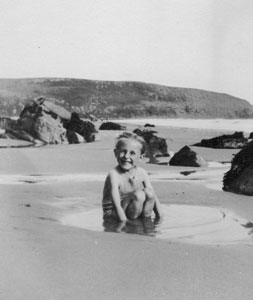
|
Martin Lings at age 9
|
| |
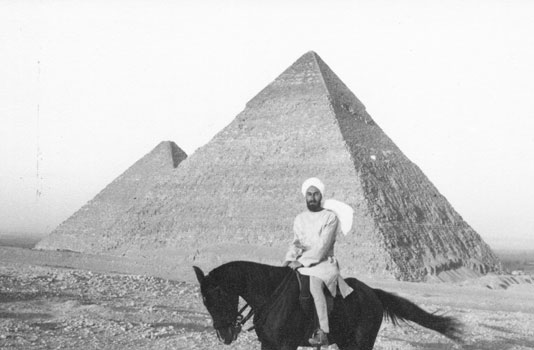
|
Martin Lings on horseback in front of the pyramids at Giza in 1940
|
| |
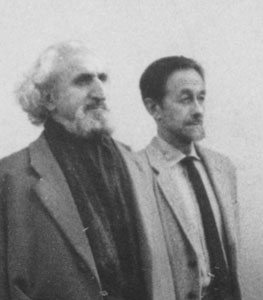
|
Martin Lings (right) with his friend and mentor, Frithjof Schuon
|
| |
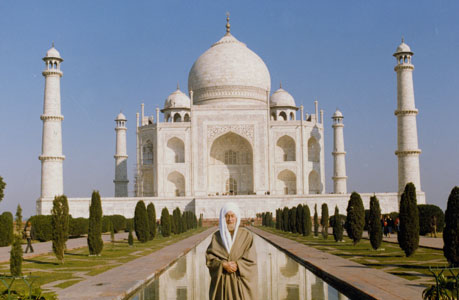
|
Martin Lings at the Taj Mahal in 1990
|
| |
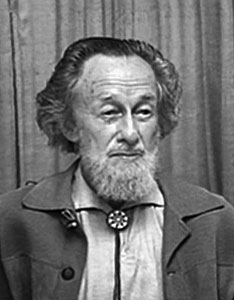
|
|
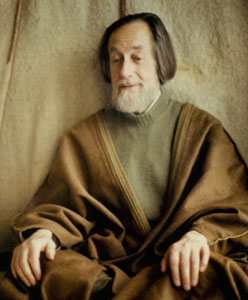
|
Martin Lings taken during a video interview in 1993. Video excerpts from the interview can be viewed in the first slideshow listed below.
|
|
Martin Lings in later years
|
|
|
•
In 1993, Dr. Martin Lings recorded a video interview in which he discussed his early spiritual influences. This slideshow has clips of Lings talking about René Guénon and Frithjof Schuon, who influenced his intellectual and spiritual development.
Martin Lings: Video Clips on his Early Spiritual Influences
|
•
This video slideshow shows clips of two long-time friends of the late Martin Lings: the French author and editor, Jean-Louis Michon, and Jean-Claude Petitpierre. They talk about the achievements and qualities that made Lings such a remarkable figure.
Memories (video clips) of Martin Lings by Michon and Petitpierre
|
|

|
Martin Lings gave a talk titled "Metaphysics and the Perennial Philosophy" to the Temenos Academy. The talk was recorded, and is now available on the internet as two RealPlayer files through seriousseekers.com. Click here to go to the Serious Seekers page that has the links to the audio clips. The first part is 46 minutes long, but Dr. Lings' talk does not start till 7 minutes in. The sound quality is acceptable and the clips should work even over a dial-up connection. In the talk, Lings explains many of the key terms used in the Perennial Philosophy and summarizes most of its basic concepts. In addition, these two clips give the listener an opportunity to hear Martin Lings' great ability, and warmth, as an insightful and compelling teacher.
|

|
Archetype is the publisher of several of Martin Lings' books, such as The Eleventh Hour: The Spiritual Crisis of the Modern World in the Light of Tradition and Prophecy, Mecca: From Before Genesis Until Now, Ancient Beliefs and Modern Superstitions, and Lings' Collected Poems: Revised and Augmented.
|

|
The web site of the Matheson Trust (http://themathesontrust.org/) has several pages of great interest to those wanting to learn more from, and about Martin Lings. First, there are audio recordings of Martin Lings reading his poetry in his rich, musical voice. Then, there is a recorded talk by Dr. Lings (in three parts) titled “Frithjof Schuon and René Guénon,” sharing his memories of and thoughts on these two great figures of the Perennial Philosophy, both of whom Lings knew very well. The Matheson Trust site also features an audio recording of Reza Shah-Kazemi (a close associate of Dr. Lings for many years) speaking, often quite personally, about his mentor and teacher. The talk, in two parts, is titled “The Sanctity of Sincerity”. There are numerous other places on the Matheson Trust web site with materials by Martin Lings, as well as materials by others on topics of importance to the Perennial Philosophy and Tradition.
|
 |
|
|
|
|
|
|